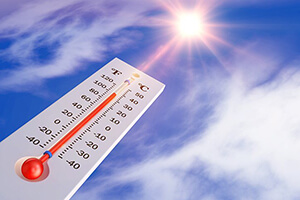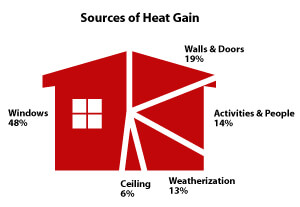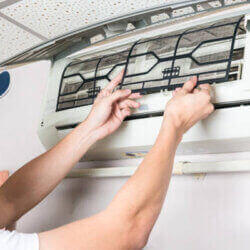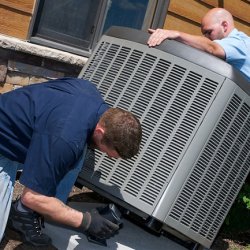
There are several things that will compromise the proper function of your air conditioner. One of the most common issues is heat gain. Heat gain interferes with the cool temperatures that you are trying to achieve in your house resulting in higher eclectic bills and reduced comfort. For this reason, it is important to understand the common causes of heat gain to help you mitigate it.
If you are in need of any HVAC services in the St. Louis area, from installation and maintenance to helping you reduce heat gain and improve system efficiency, contact Galmiche & Sons online or by phone at 314-993-1110. We have been proudly serving all of St. Louis’ heating & air conditioning needs for many years and look forward to helping you with yours!
What is Heat Gain?
It is a basic principal of thermodynamics that hot air expands and moves to fill space, while cold air stays flat. Therefore, as your air conditioner unit runs, the indoor air naturally becomes cooler than that outside. As a result, outside air will try to get inside the house. This is what is referred to as heat gain.
Heat gain mainly occurs through leaks in the building, conduction through poorly insulated surfaces, and solar radiation through glass surfaces.
What Are the Common Sources of Heat Gain?

Heat gain will result in the air conditioner working harder to maintain cooler temperatures, which unfortunately translates to higher utility bills. Identifying the most common sources of heat gain in your house is crucial for you to be able to control them. Here are some of these sources you should pay special attention to:
- Windows and Exterior Glass: Solar radiation commonly contributes to heat gain through windows. To prevent this, consider planting shade trees outside the windows as well as installing window awnings. Inside, you can have the windows covered with shades and close them during the day.
- Air Leaks: Air leaks also contribute to about 13% of the heat gain in your home. Filling any gaps and cracks with caulk can help you control the air leaks. Be sure to use weather-stripping around doors and windows as well.
- Internal Heat Generators: There are many appliances that are used in the house that contribute to heat gain. While you can’t necessarily stop using these completely, you can ensure that you schedule activities that require the use of such appliances when it is cooler outside. Using LED and CFL bulbs as opposed to incandescent light bulbs can also help.
- Conduction through the Ceiling: Heat gain through the ceilings accounts for up to 6% of the heat gain in your home. To control this, it is important that you install attic ventilation as well as ample exhaust vents.
- Improper Insulation: Insulating your walls and ceiling will play a major role in dealing with heat gain through the walls. Have extra insulation installed and aim for R-15 on the walls and R-38 for the attic floor.
Learn More About Heat Gain & Your St. Louis Home
Heat gain will have you spending a lot more on utility bills than your family budget would like. However, there are steps you can take to prevent and manage heat gain throughout your home to ensure comfort while saving money. We hope that the information above can help you to combat heat gain in your home. If you would like to learn more about improving efficiency and comfort in your St. Louis area home, reach out to us at 314-993-1110. We will happily take care of all of your heating & air conditioning problems, as we have for St. Louis residents for many years.









